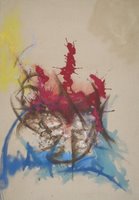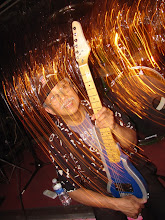Remembering Victor Oteyza

REMEMBERING VIC OTEYZA, BROADCAST'S UNSUNG HERO
By: Javier J. Calero
Portrait of Victor by son Julian
This piece is being written because I feel I have to: because if I don't, who will? Because the man I am writing about has done a lot for Philippine radio and should be recognized, because I like him and because there are many unsung heroes in Philippine broadcasting who deserve to be recognized.
In writing about Victor Sta. Maria Oteyza, broadast’s unsung hero, I hope I am able to express in whatever small way our thanks to this gentleman. He certainly left his distinctive mark on me.
I first met Vic a few days after I joined J. Walter Thompson in November of 1958. As part of my orientation tour, I was to spend a week with the Radio/TV Department as it was called then. I well remember sitting in absolute awe as this man talked about philosophy. I don't know how we got into the subject but there we were, enmeshed on the subject.
It was obvious that Vic, as he was fondly called by his peers, had an indepth knowledge of the subject. He was very much at home with Bacon as
he was with Whitehead. What I didn't realize then, but which I learned later, Vic was quite a philosopher himself.
TRIPS
Whenever I go to the provinces, specially the South, I sometimes get reminded of the earlier trips I took to these places many years ago. As a young professional, it was customary for people working in J. Walter Thompson to do both media and store checks, something we still adhere to today at the agency.
The very first trip I took was specially memorable. I was traveling with Vic. That trip and subsequent trips with Vic proved memorable, but were never parties. They were hard work. They meant visiting the radio stations in each
area whether JWT had programs in this station or not. It meant checking the quality of their respective broadcasts.
This we did by first monitoring the programs from the hotel. We would "sneak" into town, so to speak. No advance warning of the trip was given. After we did our media quality checks, we would call on the respective stations and tell them of our findings.
The station managers, in turn, would open their hearts out to Vic, because they realized that in him they had a colleague, a friend and that he would be their ally in asking their Metro Manila-based management for new equipment, more personnel, better operating conditions, etc., etc. They knew that Vic was Malakas with their top management and a word from him would get
their requests processed fast.
TALENTS
Later on, we would call on the talents we had in the field-producers, directors, voice talents, writers. He would review their storylines, go through rehearsals, inject his ideas, revise scripts, relocate talents in some extreme
instances.
"It meant three or four times as long rehearsal periods for any length of script," says Art de Guzman, a person who worked very closely with Vic.
Furthermore, Art adds, "It meant employing all known methods, including the Russian system in acting and directing, conducting seminars and
workshops for talents in all production centers in the country, inspiring even radio station officials and personnel to help in a common effort of coming up with the best production everywhere."
Vic discovered in his late twenties what he wanted to be and pursued it with a lot of tenacity. His "boys" at JWT, and by this I am referring to Phil Ruiz, Pio Acampado, Jr., Art de Guzman, and others, are unanimous in their
opinion that on top of everything else, he was a hapless perfectionist.
LIFETIME STUDY
According to him, a thorough study of even trivial subject like the evolution of a pebble, could take a lifetime. It would therefore be to one's advantage to discover early in life what one wanted to do with himself.
Vic, as you may already have guess "discovered" his way into radio. He was a mathematician by education, an artist by avocation, a broadcaster by profession. He also prided himself in writing although this came through sheer discipline.
Every night before he went to sleep, no matter how late he would spend at least thirty minutes writing about the events of the day.
"Writing to me," he used to say, "is also painful process of raking at your brains and guts in order to say something."
The thirty-minute ritual was on top of whatever other writings he had to do in the course of the day.
AVANT GARDE PAINTER
As a painter, he was one of the four avant garde painters who started the modern art movement in the Philippines. Kiddingly, he would say, "When
I realize that success in these fields would come to me only in limited and measured terms, I gave them up and went into advertising."
But don't let that fool you, he was an accomplished painter, one of his earlier pieces won over the work of Hernando Ocampo. He never gave up painting, his writing, his love for the arts, he went into advertising. He, in fact,
brought this "smattering of ignorance" as Oscar Levant was wont to say, into the broadcast profession.
RENAISSANCE MAN
Vic, was to me, a Renaissance man in every word. I suspect he really devoted his life to advertising, because Vic never could shake off being a teacher, a Dr. Pygmalion of sorts.
He discovered and developed many a talent in his time too numerous to name in this article.
He as completely enamored with the realization that he could, in his small way, have an
opportunity of changing attitudes of our people and motivating them to aspire for better, fuller and more prosperous life.
In his hands, a third-rate movie starlet bloomed into a possible actress. According to Art de Guzman, "stevedores, longshoremen, bus conductors, drivers and sometimes bums, enjoyed the benefits of his tutelage and along with the properly gifted, became writer, directors, producers, and yes, agency staffers.
RADIO GREATS
Vic worked with the leading greats of radio in the fifties: Tony Cayado (Principe Amante), Jose De Villa (Dr. Ramon Selga), Fernando Fernandez (Gulong ng Palad), Teddy Baldemor (Tawag ng Tanghalan), and directors like Fred
Gonzales, Anding Gonzales, Hernando Ocampo, Eddie Ilagan, Domingo Principe, musical directors like Domi Salustiano and other talents like Pepe Pimentel, Luz Fernandez, Phil Ruiz and Rafael Yabut.
It's no wonder-programs handled by J. Walter Thompson then would climb up as the top-rating radio shows.
"P & G shows and later PRC programs," says Art de Guzman, "would rate so high that people would reckon the time of day in terms of the intros of the programs."
During the Grand National Finals of the Tawag ng Tanghalan, the whole of Metro Manila and Luzon would tune in. A live broadcast of the show in the Quirino Grandstand in the 50's caused quite a riot because some people were jostling for a better position. That day, the Manila Hotel found itself with many a broken window.
CHALLENGING THE CHAMP
Tawag enjoyed a good following right from the very beginning but it was Vic's innovative "Challenge the Champion" portion that pulled the ratings to unprecedented heights.
His tenacity in getting a project going was unmatched. Jun Jison recalls that when Vic wanted to start Tawang ng Tanghalan in Illonggo, the fact that they did not have a studio did not faze him.
They went all over the city talking to movie house owners and finally got one operator to agree to stop screening for two hours once a week to accommodate the show.
Jun reports, "He helped me audition for the host of the show (there was not one with experience available). After four days of continuous audition and twenty hours of interviews, we decided on a male butcher and a female market vendor, both of whom showed some promise. He stressed the need for me to train and mold them into outstanding performers.
GO SIGNAL
The following day, he left for Cebu. Five days later, I received written instructions to start "Dalan sa Kabituonan" as planned in the movie houses with the tall, funny looking butcher and the short, chubby market vendor. But
remember this, in radio looks don't count."
Needless to say, the show was a success in spite of the fact that Jun reports he nearly got sacked for having gone overtime by twenty minutes during the first show, a major goof. Client P&G wanted him sacked, Vic stood up for him and backed him up. Jun stayed and has had a very good relationship with P&G ever since.
Success never went to his head because he was never satisfied with his unending quest for knowledge. Nothing was trivia to him, he was
always "tuned in."
TUNED IN
Like in the cases of a female director of one of the leading programs produced by JWT over DZRH. Rumors had reached Vic that this lady would elope with a well-known male talent. Vic immediately instructed his staff to field a
standby director. When the directress failed to show for the day's live broadcast, the standby director was ready.
Vic decided to migrate to the US when his networks started to take over productions from the agency.
To Vic, wherever you are, we want to let you know that we still have you very much in mind.
Yes, your friends, the likes of Lino Castillejo, Chuchi Escudero, Manoling de Leon, Joe Magsaysay, Willie Garcia, Tony Tolentino, Gregg Trindad, Lyle Little, Rolli Choa, Abe Yabut, Jun Jison and Art de Guzman, all of whom took time off to give me a few insights on the man I have grown to like and admire send their warmest.
To them, I too want to express my thanks.
Article from "KBP Broadcaster" of 1999 by J. Walter Thompson's Chairman Emeritus, Javier J.Catero
© 2004 Comcast Cable Communications, Inc. All rights reserved.
Privacy Statement Terms of Service Contact Comcast












